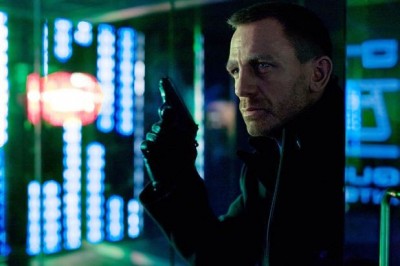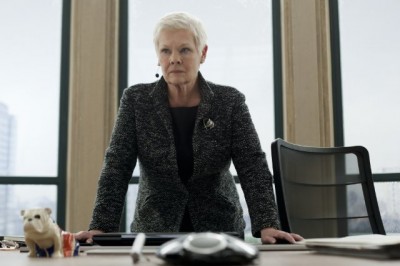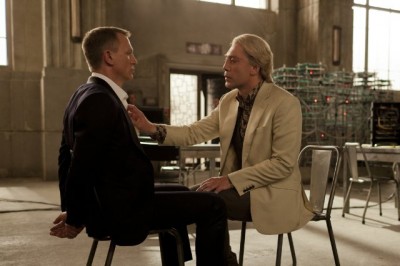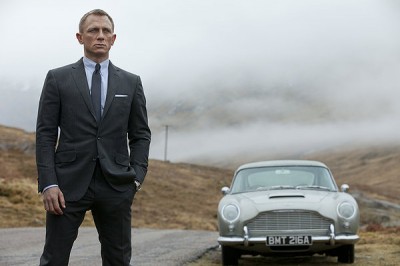
Let’s get the easy part out of the way first: Yes, it’s better than Quantum of Solace (2008), but honestly, lots of things are. Skyfall — or The Dark Spy Rises — is a great-looking movie with all manner of interesting things in it. It also has a mostly swell villain and a couple of really good sequences. All in all, it’s an entertaining watch — though longer than it needed to be (the mass exodus the second the end credits kicked in tells me that’s not just my opinion). It is also more than a little bit of a mess that tries to be more than it is — and really can’t support its efforts at quasi-heavy thematic content — even with such a “weighty” director as Sam Mendes at the helm. As a result, its attempts to make statements about aging, being judged no longer relevant, and being out of one’s time are so shoehorned in that they come across with all the delicacy of a sledge hammer. While there is almost certainly a great film to be made on these topics, this is not that film — and Bond is probably not that character.

It’s undeniable that James Bond is an anachronism in today’s world. He’s a construct of the Cold War and of a world where good guys and bad guys were more readily obvious. But really, Bond — even while the Cold War was still a going concern — was always on the reactionary side. That became increasingly obvious as the 1960s really became the 1960s. By 1964, Bond was giving a disparaging assessment of The Beatles — and that signaled his tone of ignoring, for the most part, the existence of a counterculture. Bond remained an essentially 1950s figure — and the movies with their slick pop theme songs and jazzy soundtracks followed suit. (I realize this is a simplification, but it’ll have to serve in this space.) So it’s not like Bond just suddenly became anachronistic. Similarly, Skyfall‘s dig at Bond’s famous gadgets comes as little surprise when Q (Ben Whishaw) dismisses them with, “You were expecting an exploding fountain pen? We don’t really go in for that these days.” Sir James Bond (David Niven) addressed these things — “You’re jokeshop spies” — in the 1967 Bond spoof Casino Royale. All this, however, is everywhere in Skyfall. But apart from Bond and MI6 being deemed irrelevant by the film at times, does it really get into the topic or say anything of note? No, it just mentions it — a lot — and that’s not the same thing.

Mostly, it’s a standard Bond picture — big action opening, faux-Maurice Binder credit sequence, pop theme song (in this case, instantly forgettable), etc. The only difference here is Bond gets shot atop a train, falls into a river and disappears in what must be the Reichenbach Falls because, like Mr. Holmes, he comes back. Then it’s on to the plot involving sinister cyber-terrorist Silva (a blond Javier Bardem) playing a twisted game with M (Judi Dench). Some of it works and Mendes gets credit for actually staging coherent action. A sequence at a gambling den in Macau is as striking as anything in any Bond picture. Also, it’s amusing to see MI6 fall victim to the usual evil genius flaw of keeping one’s adversary alive so he can escape and wreak havoc. And there’s a moment that’s strangely moving involving unveiling the old Aston Martin with the Monty Norman Bond theme on the soundtrack — a flash of what made those frankly silly movies somehow special in the 1960s. It works because it has 50 years of movies to give it its punch.

But by the time it gets to the end — staging a mini-version of Straw Dogs (1971) at the ancestral Bond home — it’s starting to really wear thin. When Albert Finney shows up as the old family retainer (shades of Batman’s Alfred) and another age-related remark crops up (“I’m surprised to find you’re still alive”), it’s getting perilously close to self-parody. Still, I had more fun with it than I didn’t, which is more than I can say about a lot of these big budget event movies — and maybe it’s all that needs to be said about a James Bond movie. Rated PG-13 for intense violent sequences throughout, some sexuality, language and smoking.
Playing at Carolina Asheville Cinema 14, Co-ed of Brevard, Epic of Hendersonville, Regal Biltmore Grande, United Artists Beaucatcher Cinema 7.




the ending felt kind of awkward, the begining didn’t really set up for the childhood memory reunion so it felt kind of wonky watching it progress.
How can Bond fall off a bridge that high and survive? Is he tougher than Gwen Stacy?
The screenplay says he does. That’s how. What a foolish question.
I thought there were no foolish questions, only foolish screenplays.
Ah, but does it not follow that questions about foolish screenplays are themselves foolish?
Saw this with my mom last night and we both had a blast. A couple of comments: First, it seemed to me as if MGM is intending this to be a possible finale in case they don’t do any more. The lyrics to the opening song make that kind of obvious. As a finale, I thought it worked very well.
Secondly, mom and I both noticed something very subtle that I thought was extremely clever: Throughout the film, there’s the question of whether it’s time to put Bond out to pasture and he actually does look a bit long in the tooth, but in the last scene, he looks young again (a bit of CGI trickery, I assume). Awesome.
(a bit of CGI trickery, I assume)
It’s probably more to do with the unflattering stubble and lighting they hit him with in the earlier parts of the film. Craig’s a pretty well constructed 44, so it’s not like they had to a Ian McKellen in X-Men 3 job on him.
He’s two years younger than Roger Moore was when he started playing Bond.